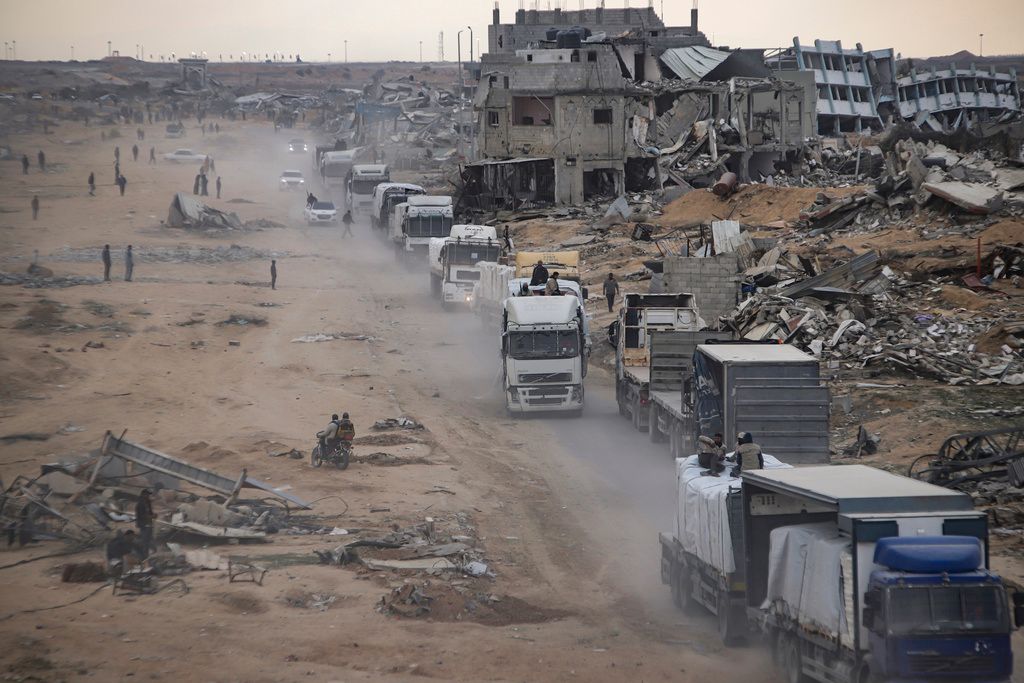
Humanitarian aid trucks enter through the Kerem Shalom crossing from Egypt into the Gaza Strip, in Rafah, Wednesday, Jan. 22, 2025, days after the ceasefire deal between Israel and Hamas came into effect. (AP Photo/Jehad Alshrafi)
The ceasefire in Gaza between Israel and Hamas stretched into a fifth day on Thursday. Humanitarian aid groups are working to surge food and supplies to the war-ravaged territory as Palestinians scour through mountains of rubble looking for bodies of those killed by Israeli bombardments during the 15-month war.
More than 120 corpses were recovered and brought to hospitals across the Gaza Strip over the past day, the Health Ministry said. It said the overall Palestinian death toll in Gaza exceeds 47,000 people. The ministry doesn’t distinguish between combatants and civilians.
Israeli tank shelling also killed two Palestinian brothers near their home in southern Gaza, the Health Ministry said. Israel's military said troops fired on armed Palestinians that posed a threat.
In the days since the fragile ceasefire took hold in the Gaza Strip, Israel has launched a major military operation in the occupied West Bank city of Jenin. Israeli soldiers and vehicles were fanned out in the muddy streets Thursday as displaced Palestinian families left the area — some carrying suitcases, pets and other belongings.
Israel says it's seeking to stamp out militancy in the area. The Palestinian Health Ministry says at least 10 people have been killed in Jenin.
Toll on kids
The war in Gaza has seen children killed, starved, frozen to death, orphaned and separated from their families, the U.N. humanitarian chief says.
“A generation has been traumatized,” Tom Fletcher told a U.N. Security Council meeting called by Russia on Thursday about the war’s impact on Gaza’s youngest residents.
He said “conservative estimates” indicate that over 17,000 children are separated from their families.
In his video briefing from Stockholm, Fletcher did not give any figures on the number of children killed. But he said, “Some died before their first breath – perishing with their mothers in childbirth.”
An estimated 150,000 pregnant women and new mothers are also “in desperate need of health services,” Fletcher said.
He said a million kids in Gaza need mental health and psycho-social support for depression, anxiety and suicidal thoughts, according to the U.N. children’s agency, UNICEF.
UN aid in hard-to-reach areas
Large volumes of aid are entering Gaza and getting to areas that were hard to reach before the ceasefire, the U.N. humanitarian office reported Thursday.
“The surge in supplies entering Gaza each day and the return of law and order has allowed aid organizations to significantly scale up the delivery of life-saving assistance and services,” the U.N. said.
At least 653 aid trucks entered Gaza on Thursday, according to the Office for the Coordination of Humanitarian Affairs, known as OCHA.
All of the aid is entering Gaza via crossings from Israel, OCHA said, as the direct Egypt-Gaza crossing remains closed under Israeli forces’ control. The aid itself is supplied by the U.N., nongovernmental organizations, other countries and the private sector.
Seven trucks of fuel were delivered to northern Gaza by U.N. humanitarian partners for the first time since the ceasefire, OCHA said. The fuel delivered to 20 health facilities in Gaza City would be enough to keep them running for about a week, it said.
Since the ceasefire, OCHA said most trucks entering Gaza carried food, but more medicine, shelter materials, water and sanitation supplies are expected in the coming days.
Across southern Gaza, the U.N. children’s agency UNICEF is giving out high-energy biscuits and ready-to-use food — enough for thousands of infants.
Also Wednesday, U.N. partners in southern Gaza distributed medical items and kits for trauma management kits to 14 hospitals.